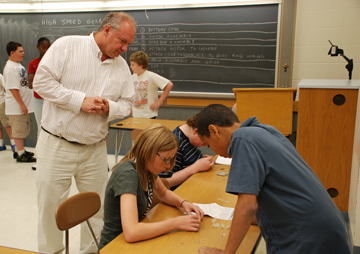Purdue Profiles: Thomas Brady

Tom Brady, professor of industrial engineering technology at Purdue North Central, works with students from Michigan City Area Schools at a summer program focused on exposing them to engineering concepts using Lego Mindstorms, a line of programmable robotic toys.
Tom Brady has been involved with Purdue for a long time. He grew up 15 miles from the Purdue North Central campus, earned his undergraduate, graduate and Ph.D. degrees from Purdue West Lafayette and now teaches as a professor of industrial engineering technology is the department chair of Engineering and Engineering Technology at PNC.
Brady, who also teaches in PNC's Master of Business Administration program and has directed summer programs with the Michigan City school district to increase student interest in science and engineering, says he is trying to give back to the university and community that have given him so much.
How did you become interested in your line of work?
When I went to Purdue, I thought I wanted to study accounting, but somehow I began taking industrial engineering courses and really enjoyed them. During my junior year, my advisor told me I was falling behind in accounting, so I ended up transferring into industrial engineering.
It's funny because most people transfer out of engineering, and here I was switching into it my junior year. People laugh now trying to imagine me as an accountant, but honestly, being a professor never crossed my mind.
So how did you come to be a professor?
After getting my undergrad degree, I worked as a consultant at a small firm in West Lafayette while working part-time on my master's. One day, my major professor told me I had been accepted into the Ph.D. program. I thought this was strange because I hadn't even applied. He explained that my thesis had been deemed as promising for further study. A year later, I took a job at Purdue and started the Ph.D. program.
What is your favorite part of the work you do?
I really enjoy the independence and flexibility that being a professor offers. I am able to choose the classes I teach and the research I do. My favorite part is working and interacting with students. The moment I can tell they finally understand something is very rewarding for me.
Your mother and father worked at PNC as well. Is this a coincidence?
Well, once I finished my Ph.D., I had offers from Miami of Ohio, General Motors Institute (now Kettering University), Indiana University-Purdue University Fort Wayne and PNC. All the offers were very good, and I wasn't sure where I wanted to go. Even on the day my PNC offer was to expire I had no idea if I was going to accept it or not. As I dialed their phone number, I still didn't know. But once I was on the phone, a vision of my parents flashed in my mind, and I ended up taking the job at PNC.
Having the opportunity to work with both of my parents -- not for them -- is not something many people get the chance to do. My father taught organizational leadership and supervision, my mother was an advisor, and we all worked in the same building for nearly five years. They have both since passed away, but it was an experience that was very special to me.
In 2009 you received the Richard Lugar Energy Patriot Award for your research on using coal and wind more productively. What did this mean to you?
First off, I was flattered because this isn't an award you apply or submit anything for; nominations are made. So I didn't know anything about it until I got the call saying I had won. Secondly, I felt very humbled by the whole experience. Senator Lugar is an icon in American democracy, and he personally picked me to win the award, which honors those working to ensure the energy independence of the United States. I was able to meet Senator Lugar personally and introduce him at his annual Energy Summit. Also, several notable people from Purdue have received this award, so to be listed among those names is such an honor.
Right now you're studying the feasibility of ferrying semi-trucks across Lake Michigan to alleviate traffic in Chicago and northwest Indiana. Why is this important?
Chicago is the hub of train movement in the U.S., and Indiana is truly the crossroads of America in terms of freight movement, so you can imagine all the traffic congestion in our area. Interstate highway traffic is such a productivity drain and not at all good for the environment, so we're exploring how to use our natural infrastructure -- in this case Lake Michigan -- to address this problem in a unique fashion.
Have there been any memorable moments from your time at PNC?
Serving as chair of the PNC Faculty Senate for seven years was a very memorable time for me. The ability to work with a variety of faculty members on governance issues was great. In that time, we wrote a new faculty constitution and received academic autonomy. But for me, it's not necessarily moments that have been memorable. It is all about the people. I've met some very special people at PNC -- students, faculty and staff -- who I know I will cherish forever.
